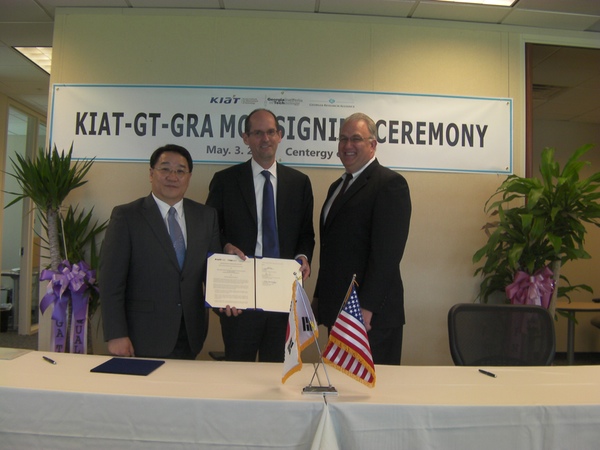In the fall of 2008, Atlanta was experiencing a major gasoline shortage. Hurricanes Gustav and Ike had rocked refineries in the Gulf of Mexico. Carl Rust asked David Bridges and James Seals if they could go to Savannah to help with a large College of Electrical and Computer Engineering (ECE) proposal. Fortunately, the duo had just enough gas to get to GT’s campus in Savannah — wondering “how are we going to get home?” all during the drive south on I-16.
They spent one week on-site working with ECE’s Dr. Kim, Dr. Al-Regib, and Dr. Hayes preparing a commercialization plan for the proposal. The concept was to develop the next generation in-home media convergence device. Its design and functionality reaches beyond AppleTV, GoogleTV, Boxee, and many other recent Internet-based television solutions.
After further work back in Atlanta, the team submitted the proposal to the Korean government for consideration. With help from Carl Rust and Dr. McLaughlin, our $9 million proposal was selected as first out of 109 submissions — a major accomplishment. Since March of 2009 the “KORUS” (Korea US) research team, along with research and corporate partners in Korea have been developing the device. David, Carl, and James have been supporting the team through gathering competitive intelligence, preparing market forecasts, and coordinating partner integration. This effort led to the visitation and temporary assignment of many Korean faculty, government officials, and government laboratory researchers to our campus.

Signing ceremony at Centergy with Dr. Yeongcheol Seok, Vice President, Korea Institute for Advancement of Technology; Dr. Steve McLaughlin, Vice President of International Initiatives, Georgia Tech;
and Carl Rust, GT EI2; 3 May 2011
Building on this relationship with the Korean government, in 2009, Dr. McLaughlin began developing a MKE/KIAT (Ministry of Knowledge Economy /Korea Institute for Advancement of Technology) activity called Global Industry-Academia Cooperation or R&BD Hub (Research & Business Development Hub).
Under this effort, MKE/KIAT are sponsoring Georgia Tech to perform research and commercialization collaboration with small- and medium-sized companies from Korea. The goal is to jointly perform pioneering research leading to new products for US markets. Successful projects are expected to have a local economic impact by growing their operation in Georgia to support the new business which may include some combination of sales, marketing, support, distribution, and manufacturing functions.
Georgia Tech’s reputation as a prominent research university combined with ATDC (Advanced Technology Development Center), our highly-recognized startup company incubator, uniquely qualified us for this program. MKE and KIAT have committed $2.5 million so far, with more expected in future years. Carl Rust and his organization within EI2 are involved in assisting with the management of this effort.
In late 2009, David Bridges and Carl Rust began developing a concept named “Global Startup Business Program in US” with the Korean government agency SBC (Small and Medium Business Corporation). The program has both entrepreneur and incubator elements. This $1.8 million proposal is intended to provide young Korean entrepreneurs an international education and hands-on training experience so they have a higher probability of success in launching their technology based new business targeting US markets. Those that are successful are expected to form a startup company and become part of ATDC. A unique part of the proposal is the notion of bringing over entrepreneurs in a cohort of 10 to 15 companies. To our knowledge, this international cohort landing concept has never been attempted. Our success with KORUS and the MKE/KIAT hub has led to this opportunity with SBC. The Korean government is scheduled to make a decision in January 2012.
Dr. McLaughlin, Georgia Tech’s vice provost for international initiatives, has on at least two occasions described this long-term relationship with the Korean government as an archetype for GT’s future collaborations with other countries. The initiatives bring foreign governments, enterprises, and economic development opportunities to Georgia. As of now, Centergy is home to the KORUS team, the R&BD Hub teams, and hopefully the new cohort SBC teams.
So if you think you’re seeing more Korean faces in the Centergy courtyard, now you know why! Make them feel welcome.
Stephen